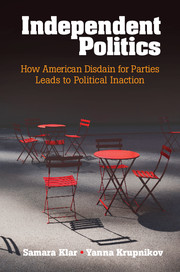Book contents
- Frontmatter
- Contents
- List of Figures
- List of Tables
- Acknowledgments
- 1 Independents in Name Only
- 2 Inside the Mind of an Independent Voter in America
- 3 How Do You Like Me Now? The Desirability of Political Independence
- 4 Everybody Hates Partisans
- 5 Partisanship and Political Participation
- 6 Undercover Partisans in America
- 7 The Myth of Partisan Compromise
- 8 The Partisan Underground in an Era of Polarization
- Appendix
- References
- Index
1 - Independents in Name Only
Published online by Cambridge University Press: 05 January 2016
- Frontmatter
- Contents
- List of Figures
- List of Tables
- Acknowledgments
- 1 Independents in Name Only
- 2 Inside the Mind of an Independent Voter in America
- 3 How Do You Like Me Now? The Desirability of Political Independence
- 4 Everybody Hates Partisans
- 5 Partisanship and Political Participation
- 6 Undercover Partisans in America
- 7 The Myth of Partisan Compromise
- 8 The Partisan Underground in an Era of Polarization
- Appendix
- References
- Index
Summary
“If you say you're a Democrat, that must mean you are a left-wing liberal with no personal responsibility. If you say you are a Republican, you must be a right-wing millionaire who doesn't care about others.”
– Jennifer Cummins, Kentucky voter“Whoever wins independent voters in Ohio, wins Ohio,” Mitt Romney's political director told Fox News with forty-eight hours to go until Election Day 2012. Meanwhile in the Democratic camp, the party's Hamilton County, Ohio chairman stressed to the Financial Times, “We need a good, solid turnout among the independent voters.” During the 2012 presidential campaign, the American media published nearly 2,000 articles addressing the thoughts, ideas, and feelings of independent voters like Kentucky resident Jennifer Cummins, quoted at the beginning of this chapter. Pundits and political operatives proclaimed that persuading independents like Cummins to pick one party over the other would be the key to electoral victory.
The pundits and political operatives who believe that independents can be persuaded are wrong.
Political scientists have known for nearly half a century that Cummins, along with the vast majority of independents, have most likely already chosen a candidate long before Election Day.
“Voters are not ‘declaring independence’ from political parties.…In fact, the American electorate is much more partisan than in the recent past,” writes political science professor and blogger John Sides. The very same people who avoid partisan labels, scholars find time and again, are independent in name only. When asked, the majority of independents will admit that they lean toward one of the two major parties, and these “leaners” appear suspiciously partisan in practice (Hajnal and Lee 2010, p. 46). They vote consistently for one party as opposed to another (Keith et al. 1992; Magleby et al. 2011), they express attitudinal support for one party over another (Keith et al. 1992; Magleby et al. 2011), and their policy preferences and affective predispositions line up consistently with just one of the two parties (Iyengar and Westwood 2014; Magleby et al. 2011). For these reasons, political scientists have dismissed independents – like Jennifer Cummins – as politically inconsequential.
But the political scientists who believe independents are politically inconsequential are also wrong.
In this book we argue that both media and political scientists fundamentally misunderstand independent voters. At best, media view independents as objective observers of American politics.
- Type
- Chapter
- Information
- Independent PoliticsHow American Disdain for Parties Leads to Political Inaction, pp. 1 - 14Publisher: Cambridge University PressPrint publication year: 2016



